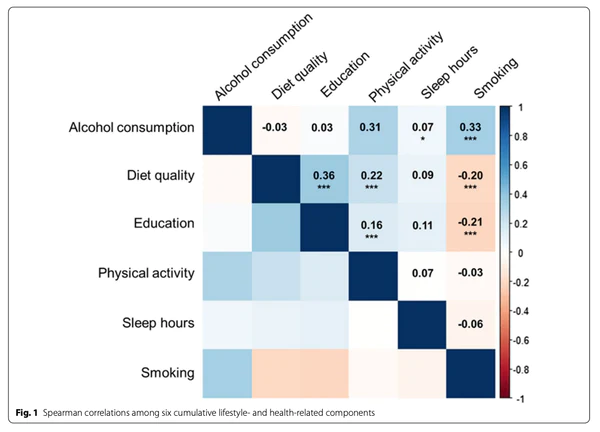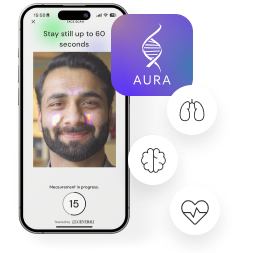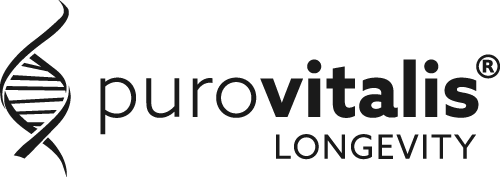
Introduction
Several lifestyle and health-related exposures including alcohol intake, smoking, diet, physical activity and education are strongly linked with age-related health effects. Some common age-related health issues include heart disease and cancer. In addition, some lifestyle exposures also lead to modification of epigenetics, which ultimately affect gene expression related to age-related outcomes. According to health experts, smoking, physical activity and alcohol consumption can significantly deaccelerate or accelerate epigenetic aging.
To minimize the limitations of chronological age because of interpersonal variability, epigenetic genes are developed to evaluate age-related changes. Marks of epigenetics, presented by DNA accumulate in the body over time due to environmental and lifestyle exposures. That’s why biological age based on DNA methylation is a beneficial biological tool to determine age-related outcomes. Several studies have shown that accelerated epigenetics are linked with age-associated health conditions such as cancer, CVD and metabolic syndrome. Furthermore, studies revealed that the GrimAge accelerator and PhenoAge Accelerator are stronger in assessing age-associated outcomes. Several health and life-style related exposures are linked with each other while studying heart diseases because of their synergistic effects. Several previous studies related to epigenetic age acceleration and lifestyle just focused on a single factor. But in this study, we focus on a total of six lifestyle exposures that lead to epigenetic aging.
Lifestyle Exposures Associated with Epigenetic Aging:
The present study included 744 individuals (353 women and 391 men). We examined six health and lifestyle exposures and their combined and individual on epigenetic aging. We determined that alcohol consumption, smoking, education, diet, sleep and physical activity had a visible impact on accelerating epigenetic aging. Among all smoking reflected the greatest contribution to aging. Furthermore, we observed that among subgroups, diet quality was a greater contributor to aging in women, while for white people, education was the greater contributor to epigenetic aging.
Moreover, physical activity and sleep hours did not show any strong association with epigenetic age as shown in figure 1.

Figure 1: Relation between lifestyle exposures and epigenetic aging
1. Smoking and Epigenetic Aging
The results of the study are strongly supported by previous studies on smoking and epigenetic aging. This reflects that the impact of smoking can overcome the effect of other lifestyle-related factors on epigenetic aging. In the study, DNA methylation markers for smoking pack year are used in estimating the GrimAge. However, DNA methylation also defines PhenoAge but it does not relate to smoking pack years. Thus, results reflect that early exposure to smoking at a young age can significantly accelerate epigenetics and heart diseases. So, there should be proper measures to quit smoking in young people in the UK to reduce the diseases prevalence and slow aging.
2. Alcohol Consumption and Epigenetic Aging
A U-shaped relation was present between alcohol intake and GrimAge. DNA methylation markers associated with alcohol intake are leptin and C-reactive protein. These results reflect those epigenetic changes reflected by GrimAge are strongly influenced by alcohol consumption and health outcomes, like CVD.
Moreover, GrimAge is an effective tool to determine the amount of alcohol intake to introduce new interventions than self-reporting. For future studies, it is important to study the mechanism between GrimAge and alcohol consumption.

3. Diet
Similar to smoking and alcohol consumption, the results of diet quality’s effect on epigenetic aging are in-line with previous studies. The results of the study reflect that the consumption of a healthy, balanced and nutritious diet can significantly decelerate epigenetic age. Furthermore, in subgroups, diet quality is a greater contributor to epigenetic aging in women, which reflects different eating patterns among men and women. Several prior studies reflect that consumption of more fast foods (high in saturated fat) can accelerate aging, especially in women in the UK. So, by adopting a proper healthy diet the process of aging can be slowed in both genders.
4. Education
Similar to the previous studies, our results reflect that the epigenetic genes are more accelerated in those with less education. For example, epigenetic aging is higher in blacks than in white people due to educational differences. As it is clear that an educated individual will prefer to consume a healthy diet over an uneducated one. And the consumption of a healthy diet decelerates epigenetic aging. Furthermore, other factors linked with health disparities in race and sex including environment, neighbourhood and behaviour also contribute to your epigenetic age.

5. Effect of Sleep and Physical Activity
There are some limitations of this study such as it just focused on the qualitative measurement of lifestyle exposures. However, quantitative measurements are also important in investigating epigenetic aging. For example, the quality of sleep including sleep patterns, sleep disorders and irregular sleep was observed and its effect on epigenetic aging. While the effect of sleep duration was not considered. The results reflect that individuals having poor sleep quality have accelerated epigenetic aging. On the other hand, proper sleep is strongly linked with the deceleration of epigenetic aging among participants.
Moreover, we studied the effect of different types of exercise such as weight-lifting and aerobics on the acceleration of epigenetics in participants. But we did not observe the intensity score of these physical activities. Similar to other factors, individuals doing exercise have decelerated epigenetic aging more than those having a sedentary lifestyle.
Epigenetic Age Testing
If you are curious about your body and memory age, you can use the Muhdo Epigenetic Test Kit. This kit will not only answer these questions but also provide information on your body’s needs based on your DNA, prepare a workout plan, and check your inflammation levels. With all the given information, you can take better care of your well-being.
Conclusion
Epigenetic aging is a multifactorial trait. It is influenced by several health-related and lifestyle exposures. The major lifestyle and health-related exposures that influence epigenetic aging include smoking, alcohol intake, education, quality of diet and sleep and physical activity. The results of the study reflect that among all mentioned lifestyle exposures, smoking is the major contributor to epigenetic aging. Smoking reflected a major contribution to GrimAge, almost 83%. After smoking, alcohol consumption was the greater contributor to epigenetic aging while education comes at number three. On the other hand, remaining lifestyle exposure such as diet quality, sleep quality and physical activity has minimal impact on accelerating epigenetic aging. Furthermore, this just focused on qualitative parameters, so in the future, more research is required.
Here you can find 11 lifestyle hacks to improve your longevity.
References

Track 20+ health metrics with AI-powered accuracy. Start your free trial today and take control of your wellness journey!

longevity tips best exercises nutrition diets healthy lifestyle
The art of living well a life that’s not measured by years alone, but by experiences, health, and joy!









